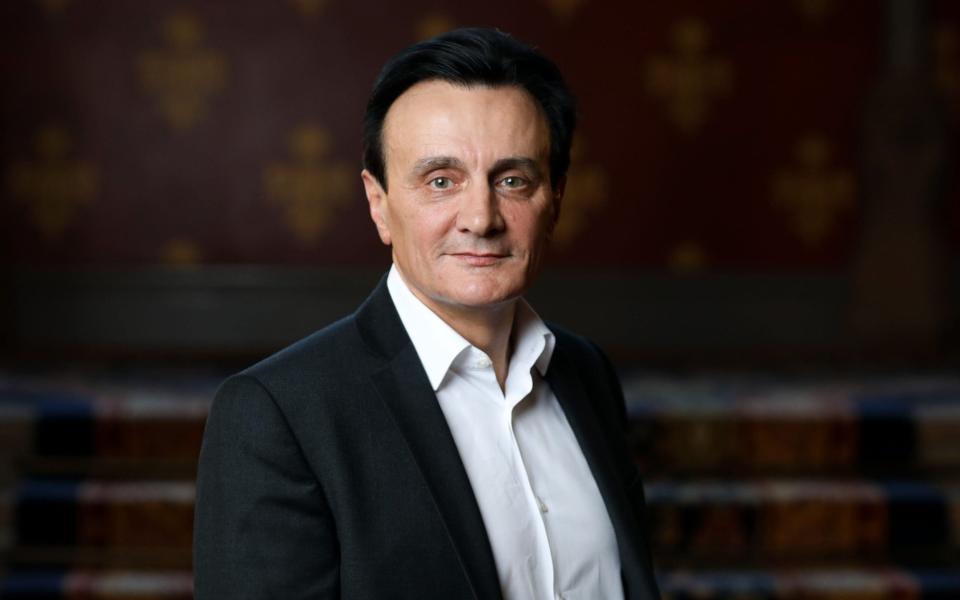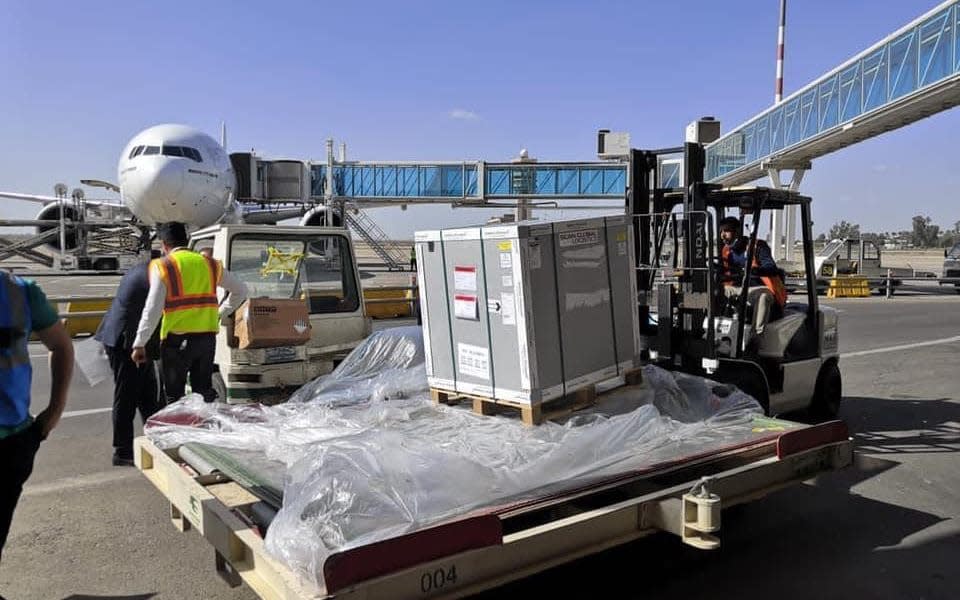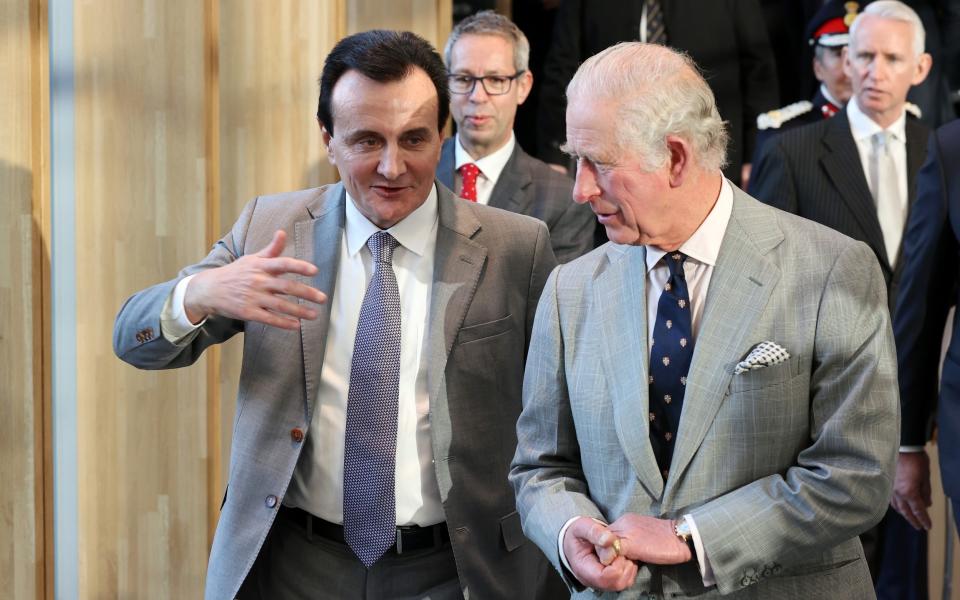Booster jabs for all ‘not a good use’ of taxpayer cash, says AstraZeneca boss

Widespread annual Covid-19 booster jabs are "not a good use" of taxpayer cash, according to the chief executive of AstraZeneca.
Pascal Soriot told The Telegraph that research suggests the vaccine gives healthy people protection against severe disease for a "long time", meaning most will not need a top-up jab to avoid severe complications from the virus.
Speaking to The Telegraph, Mr Soriot said: "People who are otherwise healthy - especially if they are young, have been vaccinated, have had a boost already - boosting them again, I'm just not sure it's really a good use of resources."
Research suggests immunity among most healthy people against severe disease should last "more than a year for sure," he said, and could persist for three or four years.
Boosting elderly people may be a good strategy given they are more at risk, Mr Soriot added.
AstraZeneca has previously suggested that governments should wait for more data on how effective two doses were before offering a third dose to the general public.
AstraZeneca is currently lobbying officials to spend more on Covid antibody treatments for immunocompromised people, such as those with blood cancers or transplant patients. Ministers have faced criticism from leading healthcare charities over their decision not to order AstraZeneca's Evusheld, which is available in many other countries. It has been approved for use in the UK, no orders have yet been placed.
Evusheld provides protection against severe disease for people who are unable to get that protection from Covid vaccines.
"All other countries in Europe and the US, and elsewhere have decided they need to allocate some budget to the immunocompromised,” Mr Soriot said. “The UK thinks it needs to allocate its budget elsewhere.”
Britain is readying for its next Covid booster roll-out, which is set to kick off in the coming days. Care home residents and healthcare staff are due to be among the first to receive their next jabs, but the vaccines are expected to be offered to everyone over 50.
The UK is using Pfizer and Moderna vaccines for its booster efforts, rather than AstraZeneca vaccines.
Interview: As Covid recedes, the French-born executive eyes the next breakthroughs
Pascal Soriot appears surprisingly well-rested for a man who has rarely left the spotlight over the past three years.
“I took a couple of weeks off this summer,” the AstraZeneca chief executive smiles. “My grandson came over from Australia. We got the whole family together. I think you always want to spend more time with your family.”
Soriot has had little time to relax in recent years. During the pandemic, his work days only became longer and his diary fuller as AstraZeneca raced to develop and then manufacture a vaccine for Covid-19.
“It was the same for everyone wasn’t it?,” the 63-year-old shrugs when asked about his workload. “We were all locked up anyway.”
For some time, rumours have swirled over his impending retirement. The French-born executive has been at the helm of AstraZeneca for ten years now.
Soriot dismisses talk of his exit. He has not decided when he will go and expects to work with new chairman Michel Demaré for “many years to come”.
“There’ll be a point when someone else will come in to lead the company, but it’s not today.”
For now, Soriot appears reinvigorated after some much needed downtime: “What we do is exciting, it’s new science, new products. And yes, it’s sometimes stressful, but most of the time, it’s exciting.”
As the pandemic recedes, Soriot is keen to embrace the next challenge. Cancer, he says, is a “very, very big issue” and the company is already having breakthroughs on new treatments. Cardiovascular disease, too, is a major area of attention.
Both are conditions where there is a significant need for advances, with patient backlogs currently at record highs.
For many, AstraZeneca is still a name irrevocably linked with the pandemic. The business was propelled into the spotlight in 2020 as households looked for any hope of an end to lockdowns.
AstraZeneca entered 2020 as a relative minnow in vaccines, compared to GlaxoSmithKline, Merck and Pfizer. Its deal with the University of Oxford to develop and make a Covid-19 vaccine pushed it to the forefront of efforts to stop the virus in its tracks.

In the first 18 months of the pandemic, AstraZeneca delivered 3.5bn doses of vaccine – many to lower income countries.
While AstraZeneca and Pfizer delivered similar levels of vaccines in 2021, the impact on their finances was drastically different. Pfizer made $37bn in revenues from vaccine sales last year, boosting profits to almost $22bn. AstraZeneca, which pledged to deliver the vaccines at cost during the pandemic, generated $3.9bn in revenues from its vaccines. Profit after tax was $115m for the year.
"The lower revenue is simply linked to our much lower price," Soriot says. "But there's nothing to regret about that."
If another global pandemic hit, would he make the vaccine at cost again?
“I think we probably would,” he says. “Every set of circumstances will be different. This was a very special one because it was a true pandemic, and we needed to vaccinate as many people as possible. We needed at least one or two doing it at cost, or it wouldn’t be possible.”
Yet AstraZeneca was beleaguered by vaccine production woes and concerns over very rare blood-clots. Political leaders in Europe were among the most critical, with AstraZeneca’s vaccine branded “quasi-ineffective” by Emmanuel Macron. The comments fed into a general wariness about the jab which has still not dissipated today.
AstraZeneca's vaccine is still not being used in many Western booster roll-outs, despite data showing it works, with many countries preferring mRNA vaccines made by Moderna and Pfizer.
“The comments were hard for us to take,” says Soriot. “But in our industry, you have to be used to scepticism and criticism. People will doubt your ability to succeed and when you fail, because you will fail – we all fail from time to time – then people criticise you.
“The world is full of people who know better than everybody else after the event has unfolded.”
Difficulties ramping up production in certain countries also prompted the EU to sue AstraZeneca over vaccine supplies.
“I would have loved to have no issues, but what was the alternative?,” Soriot says. “The alternative was that we stayed home and didn’t do anything, and you would have had 6 million people dying, because there wasn’t enough vaccine.”

After solving production issues, vaccine developers are now faced with a glut of jabs, sparking questions about AstraZeneca’s future in this corner of the market. Its rivals have been splurging on new variant vaccines, pumping money into boosters, but Soriot is unsure over what will be needed.
In fact, he says, he is unsure over the role of boosters at all - at least for healthy people.
“We still don’t know the answer to this. Fundamentally, most of the population [who have been given a vaccine] have this foundation immunity against severe disease,” Soriot says. “This lasts a long time, we don’t know if it’s one year, two years, three years. I think more than one year for sure.”
It is because of this that Soriot says he is unclear on whether “boosting people every year is that critical”.
“I’m not sure it’s a really good use of money, because most of the people now who catch it will just have symptoms if they get Covid, and that’s it.”
It is a different matter when it comes to elderly people and immunocompromised people, such as those who have blood cancers or are transplant patients. For the former, Soriot says, it might be worth offering boosters, as with flu. For the latter, Covid antibody treatments are vital.
Most Western countries have taken heed of this message. Doses of AstraZeneca’s antibody treatment Evusheld are being used in countries including France, Germany and the US, where they are given to those who cannot get protection from vaccines to stop them getting seriously ill.
So far “the UK is an exception,” Soriot says. The antibody treatments are approved in Britain, but no doses have been ordered.
“We're still working with the UK Government to show them that patients need this and the healthcare system needs it. But it’s their decision they have to make.”
Soriot shies away from directly criticising UK ministers: “That’s not my job, I can’t comment on politics.” But, with the Tory leadership race running over the past few months, he says, “there’s a lot of distraction going on”.
“At the end of the day, all other countries in Europe and the US, and elsewhere have decided they need to allocate some budget to the immunocompromised. The UK thinks it needs to allocate its budget elsewhere.”
This is an area AstraZeneca's new head of vaccine and immune therapies Iskra Reic is focusing on. Reic's appointment last November means more of Soriot can spend more of his time focusing on the future of AstraZeneca - a business which has grown into a pharmaceutical juggernaut under his leadership. AstraZeneca is now worth £176bn, compared to around £37bn before Soriot took over in 2014. Rival Pfizer offered to buy the business for £69bn two years after he took charge.
“I must say, when Pfizer approached us, I didn't expect the share price to be where it is today,” Soriot laughs. “I thought we could go higher than what they offered, but not as high as it is today.”
Analysts had been equally sceptical. Even the most bullish said a target of $40bn (£34bn) in revenues by 2023 was unlikely to be met. AstraZeneca is on course to hit the target this year, buoyed by its recent mega-takeover of rare diseases company Alexion.
“We’ve had our ups and downs, but overall we got there when nobody believed we would,” Soriot says.
This stellar performance has had the added benefit of boosting his pay packet, as Soriot’s remuneration is linked to the company’s share price. Last year, the chief executive took home £14m, compared to around £16m a year earlier. Soriot’s bonus package was trimmed to avoid an investor backlash.
High pay is once again becoming a major issue as the cost of living crisis bites. A report from last week suggested FTSE 100 chief executive pay surged 40pc last year, prompting fierce criticism from unions, who argued workers were not receiving the same increase in their packages.
Soriot argues that “everybody's done very well [at AstraZeneca] compared to the general environment because of how we’ve performed”.
His own pay is linked to when shares vest, meaning the sharp share price rise has driven his package up.
“But having said that, whichever way you calculate it, it’s a lot for sure. And I was born in low-cost housing so I know what it looks like. I have lots of friends who have very modest incomes."
Soriot says his pay is “relative to the market, so the question is what you do with the money”. He chooses to make personal investments and donations into companies trying to fight climate change.
If AstraZeneca continues its astronomic rise, then this topic is one which is likely to keep dogging Soriot - given, for now at least, he has no appetite to step down.
“As long as you think you can make a difference in the world, and you're intellectually stimulated and excited, then there's no reason to want to relax.”
With Soriot more enthused than ever about the future for AstraZeneca, it could be some time before his next break.

 Yahoo Finance
Yahoo Finance 